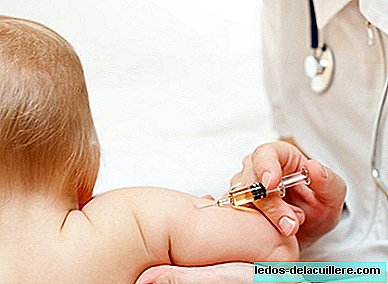
In 2017, measles cases in Europe quadrupled, affecting a total of 21,315 people, of which 35 died from this disease. Far from improving, these data are getting considerably worse in what we have been doing this year, especially affecting France, Italy, United Kingdom, Greece and Romania.
In the official vaccine schedule, the triple viral (which protects against measles, rubella and mumps) is given to children at the age of 12 months, but given the spectacular measles epidemic in Europe, the Vaccine Advisory Committee of the AEP has recommended that all Children between six months and a year who are going to travel to the affected countries with extended stays, go to their pediatrician to receive an extra dose of the vaccine.
An extra dose of triple viral when traveling to countries affected by the measles outbreak
The measles vaccine is part of the triple viral with rubella and mumps. According to the AEP vaccination calendar, a first dose is administered between 12 and 15 months and a second dose of memory between two and four years.
But due to the "spectacular" epidemic that some European Union countries are suffering, the secretary of the Vaccine Advisory Committee of the Spanish Association of Pediatrics (CAV-CAP), Francisco José Álvarez, has recommended that all children between 6 months and one year who are going to travel to the affected countries go to your pediatrician to receive an extra dose of the vaccine.
However, and as specified by the AEP, it is important to emphasize that this vaccine would only be necessary in case of prolonged stays in the affected countries, and in addition, it would be an "extra dose", not to advance the first dose."Right now in Europe we have a terrible measles epidemic, which affects countries that are usually a holiday destination chosen by many Spanish families, so if it is strictly essential to travel to those places with children under one year and over six months -before the vaccine cannot be administered- it is recommended to vaccinate of the triple viral "- said the secretary of the Vaccine Advisory Committee in statements to EFE.
"In the case of infants from 6 to 11 months of age (who have not been vaccinated, since in all Spanish calendars it is vaccinated once 12 months of age) who need to travel with extended stays in the countries most at risk, the need to receive an extra dose of triple viral vaccine (measles, rubella and mumps) must be assessed beforehand, preferably at least 4 weeks before the trip "
"In any case, By 12 months of age they should receive a new dose, the usual calendar, because the one administered before the year completed should not be counted for calendar purposes. In the case of short trips - the standard tourism trip - the risk is very low and no special measures would be required "- we can read in their recommendations.

As for itself it is safe to vaccinate children between six months and one year of triple viral, the Vaccine Committee of the Spanish Association of Pediatrics explains it on its website:
"Vaccines that include the measles component (triple viral, whose commercial preparations are Priorix and M-M-RVAXPRO) are authorized for administration from 9 months of age, but in exceptional cases, like the one discussed here, can be used after 6 months of age, as recommended by organizations such as WHO or the US CDC "
"All measles free"
But regardless of this extra dose recommended for children under one year, the AEP also recommends checking the vaccination status of the child at least 1-2 months before the trip, to be able to ensure that the necessary vaccinations can be received in time, consulting when necessary in international vaccination centers.
On its website we can read that this recommendation is also extended to adolescents and young adults: "Teenagers and young adults: if you are traveling, check to be well vaccinated against measles. And your children, too. All free from measles."
"In a globalized environment in which both people and viruses and bacteria do not understand borders, vaccines become travel insurance," said Dr. Mª José Mellado, president of the AEP.
Likewise, the European Center for Disease Prevention and Control (ECDC), as well as the health authorities of other countries such as Mexico, Argentina and the United States, also have warned of the dangers of measles in Europe, and have asked their citizens for greater awareness when traveling, - especially if it is done to the most affected countries -, previously making sure that they and their minor children are properly vaccinated.
And it is essential to travel safely in terms of vaccines for prevent the outbreak from spreading furtherWell, we must not forget that measles is a highly contagious disease: an infected person can spread up to 100 people around him through nose and mouth secretions.
Measles symptoms begin 10 or 12 days after being exposed to the virus, and manifest with high fever, cough, conjunctivitis and red pimples throughout the body that usually appear within 14 days of exposure and last almost a week.
In some cases complications may occur which would lead to otitis, pneumonia or encephalitis. These complications can seriously affect some people or even cause death, being the most vulnerable groups babies who have not yet been vaccinated, adults, pregnant women and immunocompromised people.
What are the countries affected by the outbreak?
In 2017 the balance of deaths due to the measles epidemic recorded in Europe it amounted to 35 people, an "unacceptable tragedy" - according to the words of the WHO -, considering that it could have been avoided with vaccination.
As we said at the beginning, far from improving, these figures seem to be getting worse in 2018, since only in the first four months of this year 25 deaths had already been registered due to this cause.
In some countries of Europe there is a worrying situation for the measles cases they suffer. They are, above all:
France, with 2,380 cases registered from January to May 2018
Greece, with 2,075 affected in the same period of time
Italy, with 1,715 affected in the same period of time
United Kingdom, with 630 affected in the same period of time
Romania, with 504 affected in the same period of time
 Via ECDC
Via ECDC Definitely, Anti-vaccines are one of the main causes behind this outbreak, but it is not the only one. The cuts suffered in recent years in vaccination campaigns in some countries, and incomplete vaccination are also some of the causes that have caused the largest measles outbreak in Europe.
In our country, vaccination coverage is especially high, and this led the WHO to grant Spain last year the accreditation of measles-free country, although sometimes there are some sporadic outbreaks, of which we have already spoken to you on occasion.
"In Spain, vaccination coverage up to three years of age is greater than 95% in all vaccines, included in the calendars of the autonomous communities, figures that we can qualify as very good, unlike those of other European countries like France, Italy or Germany, where it has been necessary to resort to measures such as the obligation to guarantee public health "- said Dr. David Moreno, coordinator of the Advisory Committee on Vaccines (CAV) of the AEP.
That is why it is essential continue to inform and raise awareness among parents about the importance of vaccinating their children when appropriate, as well as ensuring complete vaccination by giving them all doses.
Other vaccines that must be taken into account when traveling
But the measles vaccine is not the only one that parents who want to travel abroad with their children under 3 years old should take into account.
"He advice and protection are essential when undertaking any trip. It is important to consult the pediatrician about the need to receive protection if traveling to places with non-prevalent diseases in our country "- recommends Dr. María Garcés, co-director of the AEP vaccination days and member of the Vaccine Advisory Committee
 Thus, in the case of visiting countries outside Europe or the US, the AEP Vaccine Advisory Committee recommends going to the pediatrician and an International Vaccination Center between one and two months before the trip, to receive information about the vaccines that should be administered to minors.
Thus, in the case of visiting countries outside Europe or the US, the AEP Vaccine Advisory Committee recommends going to the pediatrician and an International Vaccination Center between one and two months before the trip, to receive information about the vaccines that should be administered to minors.So, the hepatitis A vaccine -which is not included in the Spanish vaccination calendar- is necessary to travel to all countries that are not in Western Europe, the area of Japan, Korea, Australia and the US, and can be placed from one year. And the risk of acquiring hepatitis A is "very high" in certain areas if contaminated food or water is consumed.
To travel to those same countries it is also advisable to typhoid fever vaccine which, in this case, cannot be administered until two years of age.
The Vaccine Advisory Committee also recalls that malaria - or malaria - is common in many areas and, to prevent it, you have to take a series of medications that, in some cases can also be administered after two years.
Likewise, the Secretary General of the Committee has also referred to the epidemic of yellow fever that Brazil and some African countries suffer, and that can also be avoided with a vaccine from 9 months of age.
In the case of Asia, especially Japan and Southeast Asia, there is a disease called japanese encephalitis, which also has a vaccine.
The secretary of the Vaccine Advisory Committee of the AEP has warned, however, that Children under 2 years old should not travel to tropical countries in South America, Asia and Africa since in these places there are many communicable diseases that do not have a vaccine to prevent their spread.
Via AEP Vaccine Advisory Committee
In Babies and More From A to Z: All childhood vaccines from 0 to 14 years, Measles vaccine: everything you need to know, What is wrong with not vaccinating? In 2017, measles cases quadrupled in Europe












